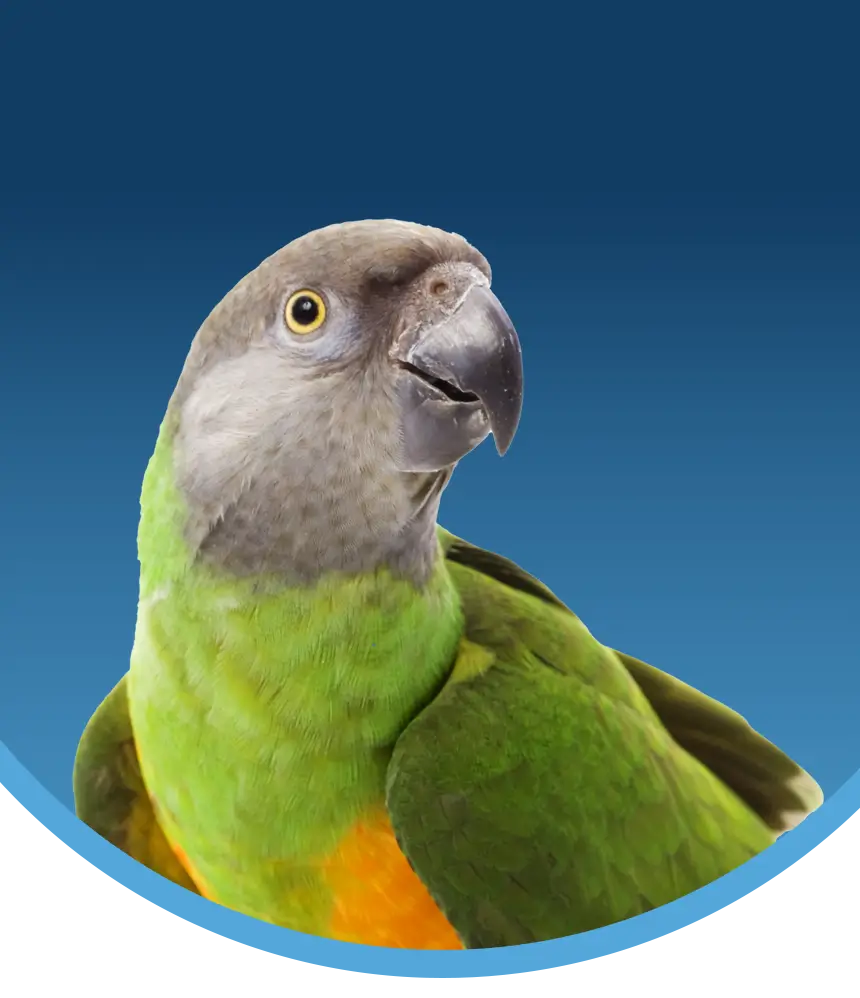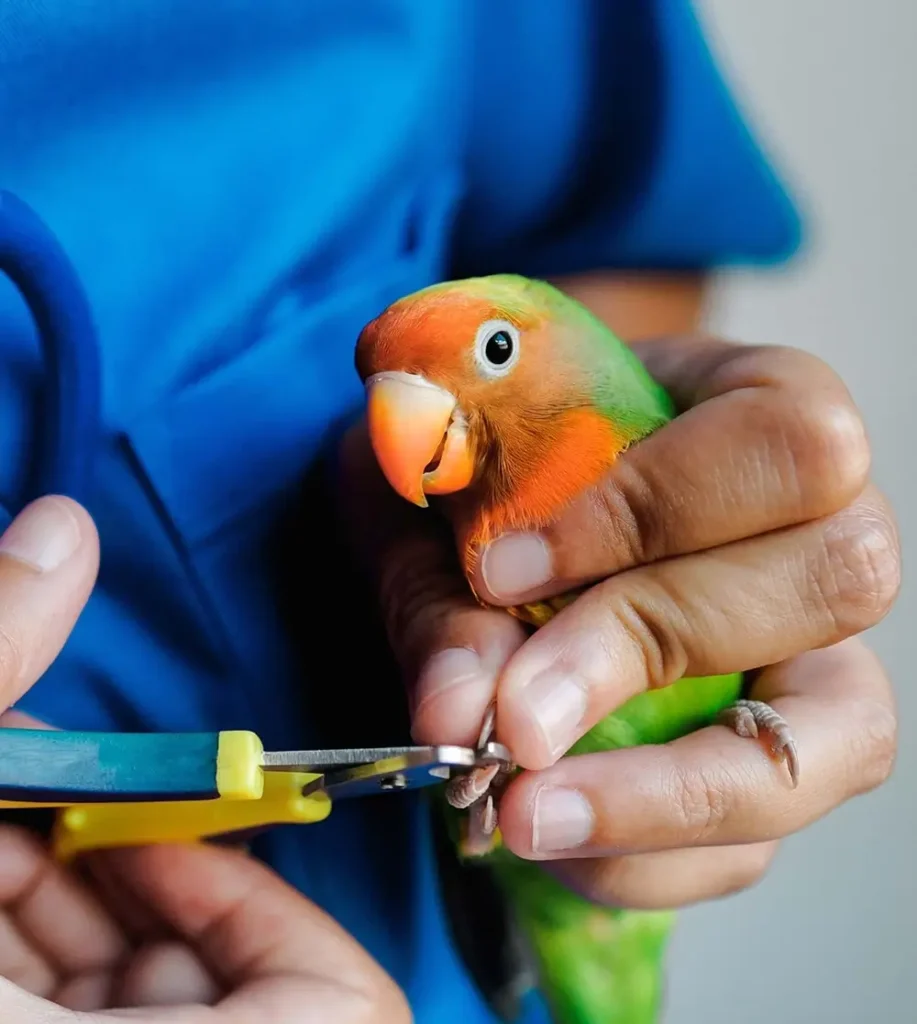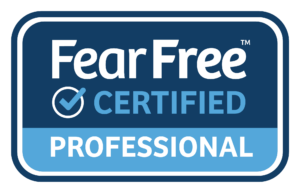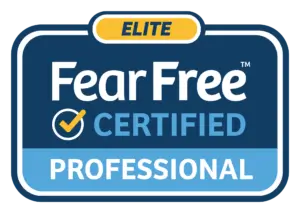Avian
Veterinary Professional Certification Program
Many bird species live for decades longer than their mammalian counterparts. This not only provides opportunity for improvement through training; it emphasizes the importance of preventing our patients from experiencing repeated, unnecessarily stressful events over the course of their lifetime. By embracing the Fear Free approach, we have the power to not only ensure excellent health over their long lifespans, but to increase hospital revenue in a significant way.

Veterinary Professional Membership
This membership is designed for all individuals employed at a practice, from veterinarians and veterinary nurses/technicians to customer service representatives and practice managers. The certification programs included in this membership are seen as the foundation for Fear Free and designed to give individuals the knowledge and tools required to start implementing Fear Free in their workplace.
This membership provides access to all Veterinary Professional Certification Program courses emphasizing different species. It is renewed annually from the date of purchase or date of membership assignment by a Team Administrator.

Course Overview
The Veterinary Professional Certification Program – Avian teaches you how to use Fear Free concepts to ensure that avian veterinary visits go as smoothly as possible. Video clips and slides show you how to recognize signs of stress in avian patients, how to use simple tools to provide Gentle Control, how to train cooperative behaviors and more.
Course authors: Alicia McLaughlin, DVM, Anneliese Strunk DVM, DABVP Avian, Barbara Heidenreich and Pamela Clark CVT, CPBC
This course is approved through the following organizations:
- 8 hours of RACE CE
Lesson 1: Fear Free: Benefits and Application to Avian Patients
After completing this lesson, you will be able to:
- Explain the physiologic and behavioral effect of stress
- Recognize the impact of veterinary visits on animals
- Discuss the client and clinical benefits of adopting Fear Free medicine
Lesson 2: Challenges with Avian Fear Free Veterinary Visits
After completing this lesson, you will be able to:
- Address challenges unique to species differences
- Address challenges unique to flight capabilities
- Address challenges with lack of socialization
- Address challenges with neophobia
- Address challenges with prior aversive experiences
- Address challenges with a low behavioral stress threshold
- Address challenges with underlying disease
- Address challenges with lack of preventive veterinary care
Lesson 3: Science of Behavior: Reinforcement and Punishment
After completing this lesson, you will be able to:
- Define operant conditioning, positive reinforcement, positive punishment, negative reinforcement, and negative punishment, and explain how they influence behavior
- Identify at least 3 potential reinforcers that can be used in a veterinary setting
- Describe why positive punishment should be avoided in the veterinary setting
Lesson 4: Science of Behavior: Classical Conditioning and Desensitization
After completing this lesson, you will be able to:
- Define classical conditioning, counterconditioning, and systematic desensitization
- Differentiate between operant and classical conditioning
- Explain how systematic desensitization and classical conditioning can be used together
- Explain the concept of stress threshold and how it applies to the practice of Fear Free Medicine
Lesson 1: Recognizing Signs of FAS in Birds
After completing this lesson you will be able to:
- Interpret avian body language in a variety of settings
- Explain how sensitivity to avian body language can help reduce FAS
Lesson 2: What Creates FAS in Birds?
After completing this lesson you will be able to:
- Identify common causes of FAS in birds
- List things to avoid in a clinic setting to prevent FAS
- Understand how to interact with individual bird patients to prevent FAS
Lesson 3: What Makes Birds Comfortable?
After completing this lesson you will be able to:
- Provide social support for birds
- Provide environmental stability for birds
- Handle birds with a considerate approach
- Allow birds to stand or perch in a normal body position
Lesson 1: Roles and Training for Team Members
After completing this lesson you will be able to:
- Explain the role that each veterinary team member plays in achieving the goal of a Fear Free visit
- Demonstrate how all team members work together in a Fear Free practice
- Identify the best training practices necessary to support each team member in working toward this goal
- Explain the role of the veterinarian in a Fear Free practice and the resources available to support them
Lesson 2: Client Education
After completing this lesson you will be able to:
- Communicate the value of Fear Free medicine to clients
- Address common client concerns
- Identify which training concepts to introduce first
- Develop written information to send home with clients
Lesson 3: Scheduling and Reception Areas
After completing this lesson you will be able to:
- Optimize scheduling guidelines for avian patients
- Establish client expectations before the visit
- Educate clients on their role
- Create an appropriate receiving area
Lesson 4: Exam Room Preparation and Patient Intake
After completing this lesson you will be able to:
- Recognize the considerations that dictate how the exam room is prepared
- Identify the details necessary to prepare the exam room
- Choose wisely the scales you will need
- Identify both food and non-food reinforcers for different species and how to use them
- Implement guidelines to follow when first placing the client in the exam room
Lesson 1: Handling Birds Safely
After completing this lesson you will be able to:
- Reduce risks for staff and patient injury
- Appropriately handle critically ill patients
- Describe basic species differences
- Safely interact with flighted birds
- Handle multiple birds in the same exam room
- Deal with extreme fear responses and aggressive behavior
- Use towels as a Gentle Control tool
Lesson 2: Gentle Control Techniques for Birds
After completing this lesson you will be able to:
- Identify a number of potential pitfalls for restraint
- Describe safe restraint techniques for a variety of avian species groups
Lesson 1: Chemical Restraint for Birds
After completing this lesson you will be able to:
- Define when it is appropriate to consider chemical restraint in birds
- Describe a number of conscious sedation and anesthetic protocols and explain when they would be indicated
Lesson 2: The Physical Exam
After completing this lesson you will be able to:
- Put together the information learned from previous lessons and apply it to an avian physical exam
- Describe the step-by-step process of an avian Fear Free exam
- Apply recommendations for conscious sedation, general anesthesia, and postponing procedures
Lesson 3: Feedback and Record-Keeping
After completing this lesson you will be able to:
- Describe appropriate record keeping for Fear Free visits
- Create a protocol for implementation of record keeping at your practice
Lesson 1: Approach to Diagnostic Sample Collection and Procedures on Avian Patients
After completing this lesson you will be able to:
- Obtain diagnostic samples and imaging while minimizing FAS
- Describe techniques to minimize FAS associated with medical and surgical procedures
Lesson 2: Hospitalizing Avian Patients with Minimal Stress
After completing this lesson you will be able to:
- Properly set up a Fear Free avian hospital ward
- Make clinical decisions with patients’ FAS in mind
- Understand options for administering medications in the least stressful way possible for individual patients
- Use enrichment in a hospital setting
Lesson 1: Training Patients In-Clinic
After completing this lesson you will be able to:
- Train hospitalized patients
- Build value for training sessions with clients
- Develop a fee structure for training sessions
Lesson 2: Case Studies
After completing this lesson you will be able to:
- Understand the complexity of managing critical avian patients in a Fear Free manner
- Consider the clinical presentation of avian patients when planning treatments, diagnostics, and procedures
- Advocate for training as an adjunctive therapy in long term case management
Lesson 1: Helping Clients Train
After completing this lesson you will be able to:
- Be prepared to introduce clients to the basic process of training birds
- Have tools and resources to help inspire and reinforce client participation and engagement
- Have a process for follow up
Lesson 2: Training Session Dynamics
After completing this lesson you will be able to:
- Understand the role of sensitive periods of development
- Understand training session dynamics
- Approach the bird effectively and assess interest prior to training
- Increase motivation for preferred food items
Lesson 3: Practical Application: How to Train
After completing this lesson you will be able to:
- Train behaviors with shaping and capturing
- Use a bridging stimulus
- Recall the benefits of antecedent arrangement
- Create an action to reinforce
Lesson 1: Behaviors that Reduce or Eliminate Stress
After completing this lesson you will be able to:
- Train a bird to orient toward a target
- Train a bird to step onto a scale and wait there for duration
- Train a bird to be safely restrained in a towel with minimal stress
- Train a bird to willingly enter a crate or other container for transport
- Train a bird to accept oral medications from a dosing syringe
Lesson 2: Additional Behavior Goals
After completing this lesson you will be able to:
- Train a bird to step up
- Train a bird for nail trimming
- Train a bird for tactile exam
- Train a bird for voluntary auscultation
- Train a bird for voluntary intranasal medication administration
Lesson 3: Addressing Training Challenges
After completing this lesson you will be able to:
- Understand how to gain compliance
- Address aggressive behavior
- Address fear responses
- Address lack of trust or socialization
Member Benefits
Discover the exclusive benefits included with the Veterinary Professional Membership. In addition to the applicable certification programs, your membership gives you access to so much more!
Additional Courses
Deepen your Fear Free knowledge and earn more CE. Explore all courses here.
Marketing Resources
Download logos, email signatures, social media graphics, and more!
Educational Resources
Peruse client communication handouts, fear, anxiety and stress assets, questionnaires, and more!
Directory Listing
Once individually certified, members have the opportunity to opt-in to be found in our online directory. Find a Fear Free certified professional or practice near you.
Certification Kit
Once individually certified, members are able to order a complimentary gift to celebrate their new certification.
Facebook Community
Join our exclusive, members-only Facebook group to share advice and connect with other Fear Free professionals.
Product Discounts
Enjoy special pricing on products and services that are aligned with our values. View Friends of Fear Free.
Merchandise & Swag
Our online store is exclusive to active members who can purchase merch and swag to promote certification status.
Certification kit and online directory listing benefits are not eligible with the Academia Membership.
I have been in practice for 30 years and this is a game-changer. I have been so pleased at how quickly and effectively I have been able to integrate Fear Free practices into my daily work, even in areas outside of primary care. It has had a significant side effect too: happy, less stressed doctors and staff.
— Suzanne Cook Olson, DVM, DACVIM

Requirements
To successfully attain and maintain certification, all members must:
- Pass each online module with a score of 80% or higher.
- Sign and uphold to the Fear Free Pledge, a commitment to follow a humane, emotionally protective code of conduct and ethical standards.
- Keep an active membership.

Earning Elite Designation
Becoming an Elite Certified Professional is for veterinary members who want to go above and beyond in their commitment to Fear Free. Elite Certified Professionals are individuals who are continually committed to a higher level of education and this status allows the opportunity to set themselves apart from the rest.
The requirements to achieve this designation are:
- Completion of one Veterinary Professional Certification Program (any species)
- Completing 35 total hours of Fear Free-provided CE
- Keep an active membership
To track your progress towards achieving Elite status, check your Member Homepage in the My Learning section.
Veterinary Professional Membership Pricing
This membership is renewed annually from the date of purchase or date of membership assignment by a Team Administrator. All pricing is in USD.
Number of Members
Annual Renewal
Interested in becoming a Fear Free Certified Veterinary Practice?
To find out more about certifying your practice, Certified Practice benefits and pricing, visit the Practice Certification page.